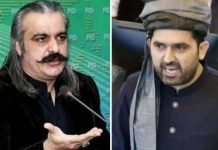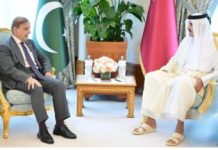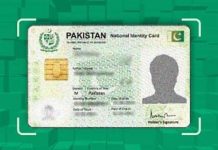Ambassador of Azerbaijan Khazar Farhadov says his country genuintley wants to co-exist peacefully with Armenai; Pakistani companies invites to take part in the rebuidling of the newly liberated areas
Excluisve
Ansar M Bhatti
ISLAMABAD: Here is the second part of the interview of Ambassador of Azerbaijan Khazar Farhadov. Full text of the interview appears in the November 2021 issue of Centreline magazine.
4. During the 44-day Patriotic War Pakistan wholeheartedly supported Azerbaijan. How would you describe the role of Pakistan?
We are especially grateful to Pakistan for its very active support to Azerbaijan in the Second Karabakh War. From the first days of the war, the Pakistani government has expressed its full moral and political support for Azerbaijan in restoring our territorial integrity. Other high-ranking Pakistani officials, members of parliament and public figures also supported us in the 44-day war, which resulted in the complete defeat of the Armenian army and the restoration of Azerbaijan’s territorial integrity. I would also like once again to note that Pakistan is one of the few countries that did not recognize Armenia. This is another manifestation of fraternal relations between our countries. We will always remember who supported us during the war. Therefore, it is not surprising that Pakistani flags are everywhere in my country. Two countries have always supported each other in all matters. As you know, Azerbaijan supports the settlement of the Kashmir issue in accordance with the relevant resolutions of the UN Security Council. This position is based on justice, international law and our fraternal relations.
5-The process of reconstruction of the newly liberated territories continues. Do you think Pakistani companies can also participate in the reconstruction process?
Immediately after the liberation of our lands, President Ilham Aliyev openly stated that Azerbaijan would give preference to brotherly and friendly countries in the reconstruction work in those territories. We are interested in seeing the close involvement of fraternal Pakistani companies in all aspects of the restoration of the liberated territories. Our relevant entities are working closely with Pakistani companies to speed up the necessary preparations. I am sure we will see real results soon.
6- The Azerbaijani leadership is interested in ensuring peace in the region, but the Armenian side does not send any positive message in this regard. Please comment on this.
As the conflict is over, we have declared our readiness to begin the delimitation and demarcation of the border between Azerbaijan and Armenia, to begin negotiations on a peace agreement based on mutual recognition of each other’s sovereignty and territorial integrity. Such an agreement can bring peace and cooperation to our region. However, we have not yet seen enough positive reaction from Armenia to our proposal. One of the areas that can lead to cooperation in the region is transport projects. In this context, the Zangazur corridor connecting Azerbaijan with its integral part the Nakhchivan Autonomous Republic and Turkey will create new opportunities for our region. Azerbaijan has created a new reality in the South Caucasus region. Armenia must choose between regional cooperation and illegal and unfounded territorial claims against its neighbors. The international community must also play a role in this matter urging Armenia to understand that there is no alternative to peace. Armenia should not support revanchism and militarization.
Azerbaijan is determined to take the necessary steps to contribute to and strengthen peace and development in the region.
7- What is the latest situation in the liberated territories in terms of infrastructure development?
Large-scale construction work is being carried out in the liberated territories because we have left the conflict behind. Azerbaijan is building new cities and settlements by applying modern urban planning and using the concepts of “smart city” and “smart village”. In Azerbaijan, which carries out all this work at its own expense, $ 1.3 billion has been allocated from the state budget this year. However, the main problem is the excessive number of mines planted by Armenia in the liberated territories. About 30 Azerbaijani citizens, including two journalists, have been killed and about 130 injured in a mine explosion since Armenia signed a capitulation act on November 10, 2020. Currently, Azerbaijan is one of the most mined countries in the world, which slows down the reconstruction process in the liberated territories and the return of IDPs to their homes. Armenia does not provide accurate maps of mined areas, and the accuracy of the few maps it provides is only 25 percent. Armenia should be pressured by the international community to provide us with accurate mine maps of all liberated territories.
8-Can you tell us the role of the Heydar Aliyev Foundation in Pakistan?
As you know, with the initiative and support of H.E. Mrs. Mehriban Aliyeva, First Vice-President of Azerbaijan, President of the Heydar Aliyev Foundation, Goodwill Ambassador of ISESCO and UNESCOthe Heydar Aliyev Foundation has implemented humanitarian social oriented projects in Pakistan.
Thus, the opening ceremony of a secondary school for girls was held on February 9, 2008 in Rara settlement of Muzaffarabad city, which was damaged by the earthquake. During these years, with the initiative and support of the Foundation, free medical diognasis and operations were provided, there were contribution to buildingof medical facilities and water supply systems, charity events were organized, peoples with disabilities were provided with wheelchairs and etc.
We will continue to coordinate with brotherly Pakistan on the implementation of new projects in this direction. All these activities are aimed at serving humanity and strengthening the friendship between the two brotherly peoples. Such projects are an example of our commitment to further strengthen the historically strong fraternal ties between the two peoples.














